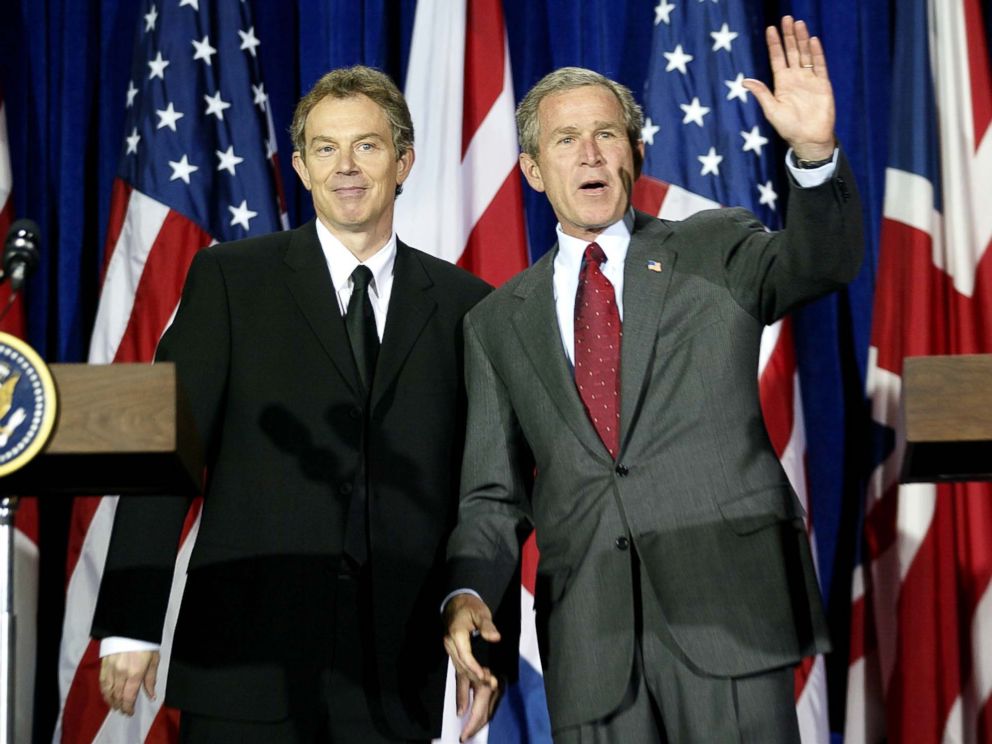Tony Blair's Secret Letters to George W. Bush on Iraq War Released
Newly released letters show Blair's unwavering support for the invasion of Iraq.
— London -- The United States may have formally made the decision to invade Iraq in 2003, but according to a long-awaited British inquiry into the war, former British Prime Minister Tony Blair also played a key role in the decision.
Blair deliberately exaggerated the threat posed by Iraq in an attempt to justify military action, according to the Chilcot report, which spans 12 volumes plus a 150-page summary. The Chilcot Inquiry is named after its chairman Sir John Chilcot and is also known as the Iraq War Inquiry. The inquiry was announced by former British Prime Minister Gordon Brown in June 2009 after British troops withdrew from Iraq. The purpose was to examine the U.K.'s involvement in Iraq and how decisions were made to identify lessons that can be learned.
At the time, the inquiry was expected to be done after two or three years, but it took almost seven years in total to complete it - longer than British troops spent in the country. The chairman of the inquiry said the panel had under-estimated the "unprecedented scope" of the inquiry, which studied about 150,000 documents and covered the period from 2001 up to the end of July 2009.
The report includes 29 declassified letters Blair sent to then-President George W. Bush ahead of the decision to invade Iraq. Here are some of the most interesting highlights from the letters.
"I will be with you, whatever."
Blair wrote these words to Bush in a letter marked as "secret" and "personal" on July 28, 2002 -- about eight months before the invasion of Iraq. In the letter, Blair set out a plan to convince the U.K. that an invasion was necessary.
“If we recapitulate all the WMD evidence; add his attempt to secure nuclear capability; and, as seems possible, add on al Qaida link, it will be hugely persuasive over here,” he wrote. “Plus, of course, the abhorrent nature of the regime."
Blair also stated in the letter that an Iraq invasion would be tougher than the wars in Kosovo, Afghanistan and the Gulf. "The military part of this is hazardous but I will concentrate mainly on the political context for success," he wrote. "Getting rid of Saddam is the right thing to do. He is a potential threat. He could be contained. But containment, as we saw with Al Qaida, is always risky."
The Chilcot report criticizes Blair for choosing to back the war before before all non-military options were exhausted.
"...our best ally might be Russia!"
In the same letter from July 28, 2002, Blair said that he wasn't sure that European countries would be supportive of an invasion. "In Britain, right now I couldn't be sure of support from Parliament, Party, public or even some of the Cabinet," he wrote. "And this is Britain. In Europe generally, people just don't have the same sense of urgency post 9/11 as people in the US." He later added: "At the moment, oddly, our best ally might be Russia!"
Blair then went on to explain ways to gain support for military action in Iraq. His plan included stressing that Saddam Hussein, Iraq's President at the time, had weapons of mass destruction -- but the Chilcot inquiry criticizes Blair for convincing himself that these weapons existed without sufficient evidence.

Blair's Plan for International Support of an Invasion
In a letter sent to Bush on Dec. 4, 2001, and marked "top secret - personal UK/US eyes only," Blair laid out a plan for convincing the international community that a regime change in Iraq was necessary. Under the bullet point "Softening up first," Blair wrote: "We draw attention to Saddam's breach of UN resolutions, we say regime change is 'desirable' (though not setting it as a military objective)... we let it be clearly seen that nothing is ruled out. But our time frame is deliberately vague." He added that this strategy would be very difficult. "We need to be very precise to avoid getting drawn into threats we are not ready to implement. But we would be unsettling Saddam; possibly forcing concession out of him...and giving ourselves room for maneuver," he wrote.
Forcing Saddam Out
Blair wrote to Bush in an undated letter: "...mobilize Arab opinion to try to force Saddam out." The note was prepared before his meeting with Bush on Jan. 31, 2003. Blair proposed seeking a UN resolution on March 5 before taking military action on March 15. Blair eventually succeeded only in the narrow goal of securing Bush's agreement that there should be UN authorization of the post-conflict role, according to the inquiry.
By July 2009, the invasion of Iraq and the subsequent instability in the country had killed at least 150,000 Iraqis, according to the report. Earlier this week a suicide bombing in Baghdad killed at least 250 people, making it the deadliest attack by a single suicide bomber since the U.S. invasion of Iraq.




